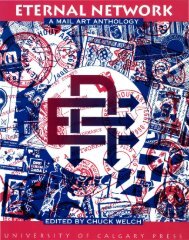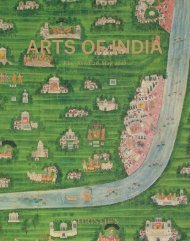1JZGauQ
1JZGauQ
1JZGauQ
Create successful ePaper yourself
Turn your PDF publications into a flip-book with our unique Google optimized e-Paper software.
AN ARCHAEOLOGY OF THE IRON CURTAIN<br />
my advert on the border guard website for information about the former<br />
militarised border as he has always found it interesting. He explains how<br />
visits to Bratislava in 1984 and East Berlin in 1987 gave him an insight to<br />
the “bleak everyday life in the Eastern Bloc” (Michael 2011 pers. comm. 10 th<br />
January). He continues to explain the effects this had on him: “This of<br />
course left a particular threatening impression on me, but then also<br />
certainly some form of fascination, when standing only a few hundred<br />
metres away from the fences, the watchtowers and the foot patrols”<br />
(Michael 2011 pers. comm. 10 th January). In 2008 when Schengen had been<br />
extended and the borders of many of the former Eastern countries were<br />
open he decided to investigate these areas that had tickled his imagination<br />
for such a long time. During weekends and holidays he started walking<br />
along the paths following the former fence line to investigate what remained<br />
of the border guards. He found small sections of the former fencing at<br />
Čižov, at Navary in South Bohemia, Czech Republic, and along a cycle path<br />
between Breclav and Potok, near the tripoint of Austrian, Slovakia and<br />
Czech Republic. He came across many border guard stations in different<br />
stages of ruin. Some have been reused, one even as a brothel, whilst the<br />
majority of the sites have been left to deteriorate (Michael 2011 pers. comm.<br />
10 th January).<br />
At the National Record in Kew Garden, London I find a story told by a<br />
South African woman feeling powerless to help her husband held in<br />
captivity by the government on the other side of the border. From the<br />
Austrian side she is trying to make the diplomats of the West understand<br />
the disastrous results a national border can have. In her letter she writes<br />
about her husband who left Czechoslovakia in 1969 because of the political<br />
situation and settled down in South Africa. Whilst in Austria in 1972 he<br />
went to the border near the town of Mikulov in order to wave to his parents<br />
whom he had not seen since he left three years earlier. The wife is<br />
suggesting that the phones must have been bugged when arrangements<br />
were made with the parents as there were several soldiers at the ready when<br />
he turned up. Although he stayed within Austrian territory he was shot and<br />
dragged by force over the border. She recalls the event:<br />
On the road left of my car I noticed a cap belonging to one of the<br />
frontier police lying on the ground. Immediately afterwards I heard one<br />
single gunshot and then a series of gunshots as if from a machine gun.<br />
By this time I had reached the bridge which spans the small canal which<br />
is the border and I looked over to the left to see two or perhaps three<br />
176




